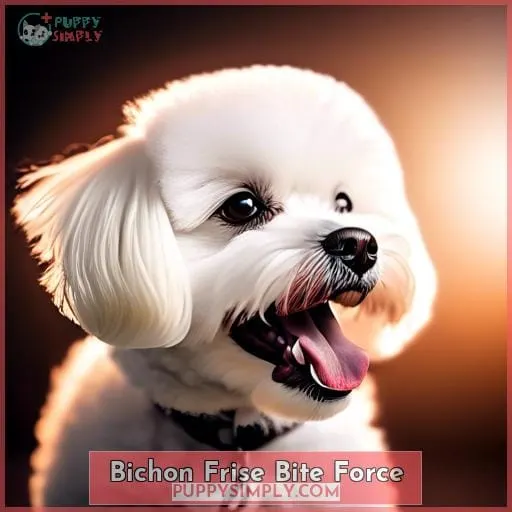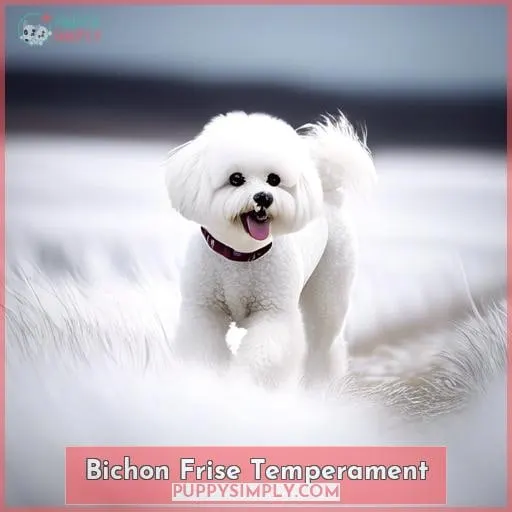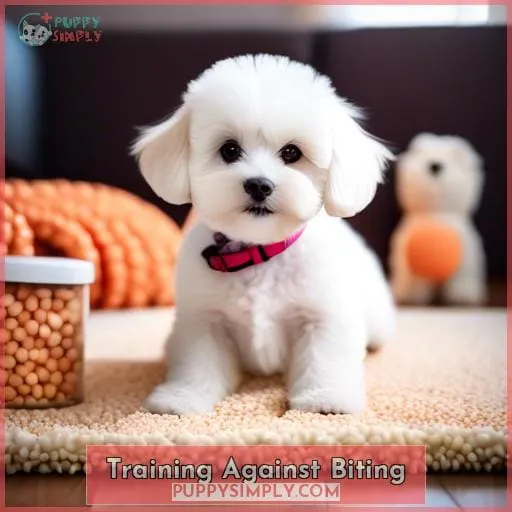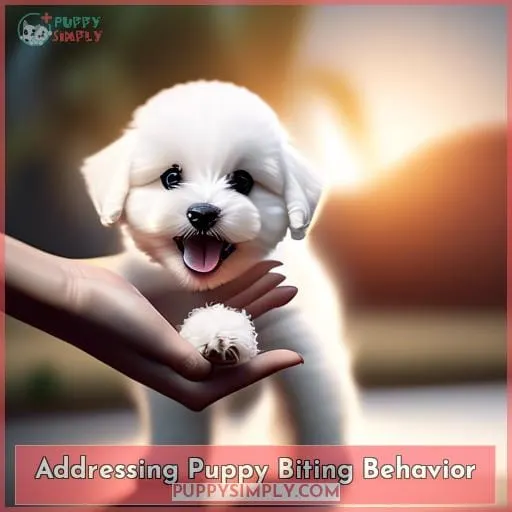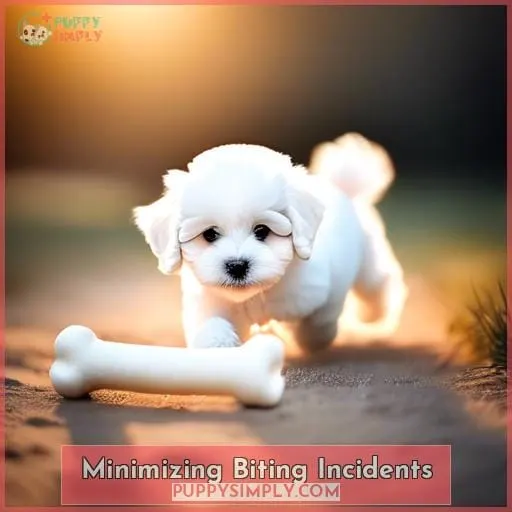This site is supported by our readers. We may earn a commission, at no cost to you, if you purchase through links.
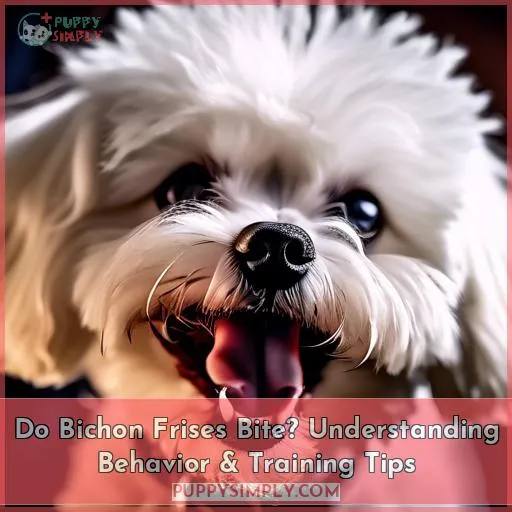 Opening the door to understanding your Bichon Frise’s behavior, you might wonder if their bark is worse than their bite. While these fluffy companions are known for their gentle nature, they can nip or bite, especially during their playful puppy days or when feeling threatened.
Opening the door to understanding your Bichon Frise’s behavior, you might wonder if their bark is worse than their bite. While these fluffy companions are known for their gentle nature, they can nip or bite, especially during their playful puppy days or when feeling threatened.
Your role in nurturing and training is crucial to ensure these moments are fleeting and manageable. Dive into the world of Bichon Frises, where science-backed training techniques and a dash of patience can transform your furry friend into the epitome of a well-mannered pet.
Yes, Bichon Frises can bite, but they typically use biting as a form of communication rather than aggression.
Table Of Contents
- Key Takeaways
- Understanding Bichon Frise Origins
- Bichon Frise Bite Force
- Pain Perception From Bites
- Bichon Frise Temperament
- Training Against Biting
- Addressing Puppy Biting Behavior
- Minimizing Biting Incidents
- Frequently Asked Questions (FAQs)
- What are the common triggers for a Bichon Frise to start chewing on its paws?
- How can I tell if my Bichon Frise is biting out of frustration or depression?
- Are there any specific environmental allergens that commonly affect Bichon Frises and lead to biting or chewing behaviors?
- What should I do if my Bichon Frise bites while being groomed or during a vet examination?
- Can a Bichon Frise develop biting habits if they are left alone for extended periods, and how can this be prevented?
- Conclusion
Key Takeaways
- Bichon Frises have a gentle and affectionate nature, making them less prone to biting out of aggression. Their behavior is significantly influenced by their upbringing, including early socialization and consistent, positive reinforcement training.
- Despite their gentle disposition, Bichon Frises can bite in certain situations, such as when they are frightened, in pain, or feeling threatened. Factors like fear, pain, or a lack of proper socialization can trigger biting behavior.
- The bite force of a Bichon Frise is relatively weak compared to other breeds, typically falling below 200 PSI. This lower bite force reflects their historical role as companion dogs rather than working dogs requiring strong bite strength.
- Addressing biting behavior in Bichon Frises involves positive training techniques such as redirecting to toys, using firm commands to communicate that biting is unwelcome, and ensuring consistency in training. Understanding the complexity of canine behavior and handling challenges with patience is key to fostering a respectful and loving relationship.
Understanding Bichon Frise Origins
The Bichon Frise, with its roots in the Mediterranean, has a rich history as a companion dog.
Initially favored by sailors for companionship during long voyages, these dogs later became a symbol of luxury among European nobility.
Their primary role has always been to provide comfort and companionship, reflecting in their gentle nature and lower bite force compared to more muscular breeds.
Mediterranean Roots
While you’re learning about the Bichon Frise’s origins, it’s essential to understand that their journey began in the Mediterranean region, where they were initially companion dogs for sailors before becoming favorites among European nobility.
- Mediterranean Influence shaped their gentle nature.
- Historical Roots trace back to maritime connections.
- Cultural Origins reflect a legacy of companionship.
- Ancestral Background informs current training approaches for puppy biting, emphasizing positive reinforcement.
Companion Dogs for Sailors
Historically, Bichon Frises frequently accompanied sailors on their voyages, serving as both companions and barter items. These seafaring pups were more than just maritime companions; they were integral to the sailors’ lives, providing comfort and a sense of home while at sea.
| Sailor’s Sidekicks | Bichons at Sea |
|---|---|
| Emotional Support | Barter Value |
| Nautical Canines | Pest Control |
| Companionship | Entertainment |
| Morale Boosting | Navigation Aid |
| Bond with Sailors | Superstition |
European Nobility Favorites
After becoming favored companions for sailors, Bichon Frises further charmed their way into the hearts of European nobility, where you’ll find they weren’t just pets but treasured members of royal households.
To add depth and engage your interest:
- Royal Companions: Bichon Frises weren’t merely pets but esteemed members within the royal courts, often depicted in portraits alongside their noble owners, showcasing their status as Historical Favourites.
- Aristocratic Pals: Their intelligence and affectionate nature made them ideal companions, embodying European Elegance and fitting seamlessly into the luxurious lifestyles of the nobility.
- Noble Canine Ties: The breed’s presence in historical records and art, such as paintings by renowned artists like Titian, underscores their long-standing connection with European aristocracy and their role beyond mere pets to being symbols of status and refinement.
Bichon Frise Bite Force
You might be wondering about the bite force of a Bichon Frise and whether it can actually hurt you. While these small dogs don’t have the powerful jaws of larger breeds, their bite force is still significant enough to cause discomfort, especially if they feel threatened or are in pain.
It’s important to remember that the Bichon Frise’s bite force is relatively weak compared to other breeds, typically falling below 200 PSI, which is a measure of the pressure exerted when a dog clamps its jaws.
However, even with their gentle nature and lower bite force, it’s crucial to train your Bichon Frise properly to prevent any biting incidents.
Measuring PSI
In considering the bite force of a Bichon Frise, you’ll find that, despite their small size and companion-dog nature, they can exert a certain amount of pressure with their bite, typically less than 200 PSI.
When measuring PSI, it’s important to understand that bite force comparison among breeds is influenced by factors such as size and breed-specific traits. Bichon Frises, known for their gentle and affectionate temperament, aren’t bred for tasks requiring strong bite strength, unlike larger, more muscular breeds.
While the exact PSI of a Bichon Frise’s bite isn’t scientifically recorded, their bite force is considered weak compared to other breeds, usually falling below 200 PSI. This lower bite force aligns with their historical role as companion animals rather than hunters or guard dogs.
However, pain perception from a bite can vary among individuals and depends on the context of the bite—whether it’s a playful nibble or a bite out of fear or threat.
To create imagery in the audience’s mind, consider the following table comparing the Bichon Frise to larger breeds:
| Breed | Estimated Bite Force PSI |
|---|---|
| Bichon Frise | < 200 |
| Larger Breed Dog | > 200 |
Training techniques are crucial for managing normal puppy behavior, including biting, and can help prevent the causes of paw chewing. Consistent training, such as redirecting to toys and ignoring the dog when it nips, can teach a Bichon Frise that biting isn’t acceptable behavior.
Behavioral tendencies like biting and chewing are part of a puppy’s exploration of the world, but with proper guidance and solutions for paw chewing, these can be managed effectively.
Comparison With Larger Breeds
While the Bichon Frise’s bite force is weaker compared to larger breeds, size isn’t the only factor determining the potential for harm. Bite force, typically measured in PSI, is just one aspect of a complex equation.
Larger breeds may have a higher PSI due to their muscular build, but behavioral variances play a crucial role in the likelihood of a bite occurring.
Proper training techniques and early socialization benefits can significantly reduce the risk of biting in Bichons, just as they can in larger breeds. Size impact on bite force doesn’t equate to aggression; stress, anxiety, and lack of training are more predictive of biting behavior than size alone.
Pain Perception From Bites
When considering the pain from a Bichon Frise bite, it’s crucial to understand that the force behind the bite isn’t the sole determinant of pain.
The context in which the bite occurs and your personal pain threshold significantly influence how painful the bite feels.
A playful nibble might be barely noticeable, whereas a bite in a more sensitive or unexpected area, especially if the dog feels threatened, could be more painful.
Factors Affecting Pain
You’ll find that the pain you feel from a Bichon Frise bite depends on several factors, including the bite’s context and your own sensitivity to pain. The breed’s generally gentle nature and affectionate temperament contribute to a milder bite force.
Pain perception from a Bichon Frise bite is influenced by individual pain thresholds and the intent behind the bite, whether it’s a playful nibble or a reaction to fear or threat.
Factors such as early socialization, reward-based training, and addressing the dog’s physical and emotional needs can help minimize biting incidents.
If you experience excessive paw chewing, it’s essential to identify the root cause, which can range from temporary discomfort to emotional issues, allergies, or boredom. Seeking professional help and implementing prevention strategies are crucial in addressing and minimizing biting behavior.
Individual Pain Threshold
Your experience of pain from a Bichon Frise bite can vary greatly due to your personal pain threshold. Pain perception is subjective, and individual responses to the same bite can differ.
Effective training techniques that account for these behavioral patterns are crucial. Consistency in training can help mitigate biting behavior, ensuring safety and understanding between you and your pet.
Bichon Frise Temperament
Bichon Frises are renowned for their gentle and affectionate nature, making them ideal companions who thrive on human interaction.
Their behavior is significantly shaped by their upbringing, where early socialization and consistent, positive reinforcement training play crucial roles in preventing biting tendencies.
It’s essential to understand that while they aren’t inherently aggressive, a Bichon Frise’s environment, training, and the attention they receive can influence their behavior.
Gentle and Affectionate Nature
Bearing in mind that pain from a bite varies, it’s important to note that Bichon Frises are known for their gentle and affectionate nature, which typically makes them less prone to biting out of aggression.
Effective training methods, emphasizing positive reinforcement, can interpret behavioral cues and reinforce their gentle nature, preventing incidents like a punctured paw pad.
Influence of Upbringing
Training and upbringing play a significant role in shaping a Bichon Frise’s temperament, as their behavior is influenced by how they’re raised and trained.
- Socialization Impact: Early exposure to various people and pets can foster adaptability and friendliness.
- Training Techniques: Positive reinforcement encourages good behavioral patterns without fear or aggression.
- Environmental Influence: A stable, loving home reduces anxiety-driven behaviors.
- Behavioral Patterns: Consistent rules and boundaries teach appropriate responses.
- Owner Responsiveness: Quick, appropriate reactions to biting can prevent future incidents.
Training Against Biting
When training your Bichon Frise to curb biting behaviors, it’s crucial to redirect their natural tendencies towards appropriate outlets. Offering a toy can provide a positive alternative to nipping, satisfying their need to chew while teaching them what’s acceptable to bite.
A firm, clear command such as no or ouch helps communicate that their behavior is unwelcome.
Redirecting to Toys
Understanding that a Bichon Frise’s gentle temperament doesn’t preclude the need for bite training, you’ll find redirecting their natural chewing instincts to toys is an effective method.
| Strategy | Benefit | Example |
|---|---|---|
| Playful Distractions | Reduces unwanted biting | Squeaky toys |
| Chew Training | Satisfies teething needs | Chewable ropes |
| Positive Redirection | Encourages good behavior | Puzzle feeders |
This approach nurtures Toy Engagement and offers Teething Tips for a happier, well-behaved pup.
Using Firm Commands
Redirecting your Bichon Frise’s attention to toys is a crucial step in training. However, it is also necessary to use firm commands to clearly communicate that biting is unacceptable.
Incorporating firm discipline and vocal commands into your training regimen provides assertive guidance.
This approach, rooted in scientific principles, ensures your Bichon understands and respects boundaries.
Consistency is Key
Always consistently reinforce your training commands; it’s the only way you’ll see progress in curbing your Bichon Frise’s biting habits.
Employing consistent methods and positive reinforcement shapes behavior patterns effectively.
Handling challenges with patience and understanding, these training techniques foster a sense of safety and belonging.
Recognizing the complexity of canine behavior ensures a nuanced approach to every interaction.
Addressing Puppy Biting Behavior
As you welcome a Bichon Frise puppy into your home, it’s crucial to understand that their biting and nipping are part of their normal pack behavior and not a sign of aggression.
As the owner, you play a pivotal role in guiding your puppy through this learning phase, setting the foundation for healthy interactions.
Consistent training, coupled with a deep understanding of your puppy’s behavior, will help you establish a respectful and loving relationship, ensuring your Bichon Frise matures into a well-mannered companion.
Normal Pack Behavior
You’ll need to tackle puppy biting head-on, as it’s a natural part of your Bichon Frise’s development and not a sign of aggression at this stage.
Understanding this behavior through behavioral insights is crucial.
As an owner, your role involves employing training techniques and socialization tips, emphasizing positive reinforcement.
This approach not only nurtures a sense of belonging and safety but also fosters a deeper understanding between you and your pup.
Role of the Owner in Training
As the leader of your Bichon’s pack, it’s your responsibility to guide them through the biting phase with firm, consistent training.
- Leadership Role: Establish clear boundaries and expectations.
- Training Dynamics: Utilize positive reinforcement to encourage desired behaviors.
- Communication Methods: Employ verbal cues and body language effectively.
- Consistent Guidance: Maintain a steady approach to training, reinforcing rules without exception.
- Building Trust: Foster a relationship based on mutual respect and understanding.
Minimizing Biting Incidents
To minimize biting incidents with your Bichon Frise, it’s crucial to start with early socialization, exposing them to various people, animals, and environments.
This foundation, combined with reward-based training, can significantly reduce the likelihood of aggressive reactions.
Addressing both their physical and emotional needs ensures they’re less prone to negative behaviors, fostering a well-behaved companion.
Importance of Early Socialization
Continuity in training is crucial, and early socialization forms the foundation of a well-behaved Bichon Frise, minimizing biting incidents and fostering trust.
Engaging in puppy classes and playgroups benefits your pet immensely, offering a platform for learning socialization techniques.
Behaviorist insights highlight these experiences as key training milestones, shaping your Bichon’s interactions and ensuring a harmonious relationship built on understanding and safety.
Reward-Based Training Benefits
Implementing reward-based training can be highly effective; when you consistently praise and treat your Bichon Frise for non-biting behavior, you’re teaching them that gentleness is more rewarding than nipping.
Early socialization and consistent training can significantly minimize unwanted behaviors like biting.
Exposing your Bichon Frise to a variety of people, animals, and settings from a young age can help reduce potential aggressive reactions later in life.
Reward-based training using treats and praise encourages positive behaviors.
Meeting Physical and Emotional Needs
Addressing your Bichon Frise’s physical and emotional needs is crucial in minimizing biting incidents, building on the foundation of reward-based training.
Incorporating enrichment activities, consistent exercise routines, and mental stimulation into their daily life fosters a strong bond.
Engaging in bonding activities and playtime strategies not only satisfies their need for companionship but also significantly reduces undesirable behaviors like biting.
Frequently Asked Questions (FAQs)
What are the common triggers for a Bichon Frise to start chewing on its paws?
Common triggers for a Bichon Frise to chew on its paws include allergies and skin infections.
Anxiety or stress, and boredom can also lead to this behavior.
How can I tell if my Bichon Frise is biting out of frustration or depression?
To discern if your Bichon Frise is biting due to frustration or depression, observe for destructive behavior or withdrawal, as these can indicate frustration.
While reduced activity and increased sleep may signal depression.
Are there any specific environmental allergens that commonly affect Bichon Frises and lead to biting or chewing behaviors?
Environmental allergens like pollen, dust mites, and mold commonly affect Bichon Frises, leading to symptoms such as paw chewing and biting behaviors.
Allergic reactions in Bichon Frises may be caused by environmental factors such as pollen, dust mites, mold, or dietary allergens. The symptoms can include itching, sneezing, watery eyes, skin irritations, and gastrointestinal distress.
Bichon Frise owners must be vigilant in identifying potential allergies in their pets, as untreated allergies can lead to uncomfortable skin conditions and, in severe cases, result in secondary infections.
To manage allergies in Bichon Frises, it’s important to consult with a veterinarian to determine the specific allergen causing the issue. This can involve allergy testing or elimination diets for food-related allergies.
Once the allergen is identified, steps can be taken to minimize exposure and alleviate the symptoms. This might include dietary changes, hypoallergenic shampoos, or medications to control itching and inflammation.
By addressing allergies early on and working closely with a veterinarian, Bichon Frise owners can help their furry companions lead happier and healthier lives.
What should I do if my Bichon Frise bites while being groomed or during a vet examination?
If your Bichon Frise bites during grooming or vet exams, calmly redirect their focus with a favorite toy or treat.
Use positive reinforcement to associate these situations with good experiences, ensuring they’re comfortable and stress-free.
Can a Bichon Frise develop biting habits if they are left alone for extended periods, and how can this be prevented?
Yes, Bichon Frises can develop biting habits if left alone for extended periods, as isolation can lead to stress, anxiety, and boredom.
To prevent this, ensure they have enough mental and physical stimulation, such as toys and puzzles.
Gradually acclimatizing them to being alone, providing plenty of exercise before leaving, and possibly getting a companion dog can also help mitigate separation anxiety and its associated behaviors.
Conclusion
Sailing through the sea of training, you’ll find that while Bichon Frises may bite, it’s a behavior that can be shaped and refined.
Your gentle guidance, paired with consistent, reward-based training, will ensure that nips and bites are but a ripple in the water.


